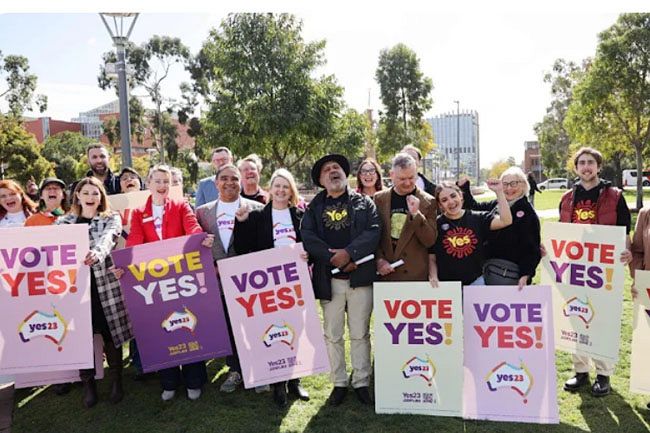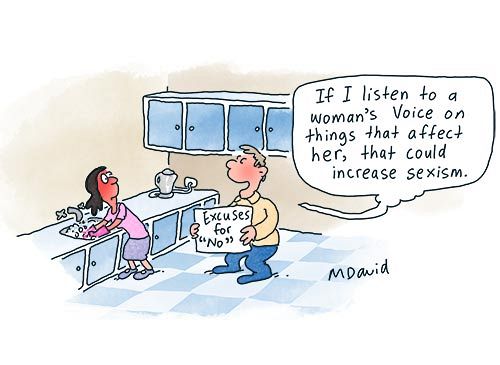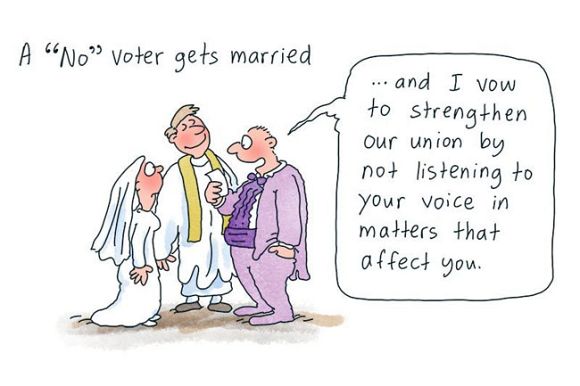While the 'No' campaign relies on disinformation to push its agenda, many in the 'Yes' camp recognise the good that can be achieved through the Voice Referendum, writes Antony Balmain.
I AM CONVINCED most Australians believe in a fair go. As Referendum day looms, I have witnessed a growing tide of goodwill from Australians of all backgrounds.
The past two weeks, I've spoken with hundreds of people door-knocking in outer Melbourne and volunteering for Yes23, phoning around the country to provide information about the simple proposition: Recognition of Aboriginal and Torres Strait Islander peoples in the Constitution and a Voice to provide advice to government and recommend solutions to bridge health, education and economic gaps for First Nations people.
It has been clear from voters that the “No” campaign has swamped social media and mainstream news with a cesspit of disinformation and confusion.
On beautiful spring days in outer Melbourne suburbs, just about everyone I met was kind and polite. We visited hundreds of houses, meeting mostly “Yes” or undecided voters who verged on “Yes” after a short discussion.
In Greenvale, northern Melbourne near the airport, a cautious older couple born in Iraq asked questions, with little idea about what it was all about. They invited us for coffee and treats, which we politely declined.
After we explained the proposal, the woman said:
“It would be best for Aboriginal people to have improved services to improve health, education and help keep people out of gaol.”
During my conversations, a clear sentiment of generosity emerged from people of multicultural backgrounds.
One man said:
“I’m voting ‘Yes’. I’m from Syria. I can’t believe there isn’t already recognition in the Constitution for Aboriginal people.”
It hasn’t all been rosy. I was abused on the phone by a man after I explained the proposed changes.
He said:
“I bet you’re being paid. You’re a fucking liar, I can’t trust the Government.”
A nurse in South Australia said she was voting “No” because she had heard “they’re going to make me pay an Aboriginal tax for my land”. I assured her that was disinformation, to no avail.
Some are too busy to speak. Most knew about the proposed changes, though wanted to know more and were very glad to find out.
An older woman from Serbia seemed unsure. She told about her travels through central Australia and her respect for Indigenous culture and asked:
“Do Aboriginal people support it? I’ve seen some on the news a lot and they’re saying ‘No’.”
We explained surveys showed over 80 per cent of Indigenous people were in favour. The woman revealed she would vote “Yes” as “it’s the kind thing to do”.
A Vietnamese-Australian woman and her sister came to the door in Cairnlea, west Melbourne. She had “heard a lot of misinformation”, but after reading more, decided to vote “Yes”. “It’s generous and important for Aboriginal people,” she said.
An older woman told me she lives with Parkinson’s disease and could hardly move. She was unsure how she could physically get to the polling booth, but she would do “whatever it takes to vote ‘Yes’”.
It was difficult for the woman to speak, but she said:
“I believe this will help Aboriginal people. We all need support sometimes.”
Another older woman had been voting “No”, but her sons had convinced her to vote “Yes”.
She said with a smile:
“I’ve got very smart sons. I heard lots of negative things from certain people but then I understood. It's the best and only viable option on the table. It’s a fair go.”
A retired teacher said he was still unsure, as he kept hearing the Referendum was dividing Australia. Despite his reservations, he recognised it was “probably the best option as better policies would lead to improved education and health for Aboriginal kids”.
My conversations confirm that racist undercurrents swirl and hate has been fuelled by the “No” campaign and its vested interests. Yet Australians from all walks of life want to accept the hand of friendship from Aboriginal and Torres Strait Islander people.
Most support recognition in our Constitution and believe when we lift each other up, everyone does better.
A tradie summed up why he’s trying to convince his mates to vote “Yes”:
“It’s a no-brainer. Is what we have now working? No. Do we have something to lose by trying something new? May as well give it a go. It can only improve things.”
One Indigenous woman brought me to tears over the phone as she said in a shaky voice what it means to her family and community:
“I’m voting ‘Yes’. It’s a once-in-a-lifetime opportunity. I want what’s best for my children and children’s children.”
Aboriginal and Torres Strait Islander Elders and communities nationwide are asking all of us a question for the generations. The least we can do is answer by opening our hearts to write “Yes”.
Antony Balmain is a journalist, media and communications manager and former aid worker who has worked alongside Indigenous Australians in cities and communities across the country for over 30 years, and has volunteered recently with Yes23.
Related Articles
- CARTOONS: Peter Dutton gives equality a go
- Cookers stir the crock to stop Australia voting 'Yes'
- EDITORIAL: Cookers stir the crock to stop Australia voting 'Yes'
- 'Yes' campaign can change its fate
- Voice Referendum: What you should do if you don't know
 This work is licensed under a Creative Commons Attribution-NonCommercial-NoDerivs 3.0 Australia License
This work is licensed under a Creative Commons Attribution-NonCommercial-NoDerivs 3.0 Australia License
Support independent journalism Subscribe to IA.














